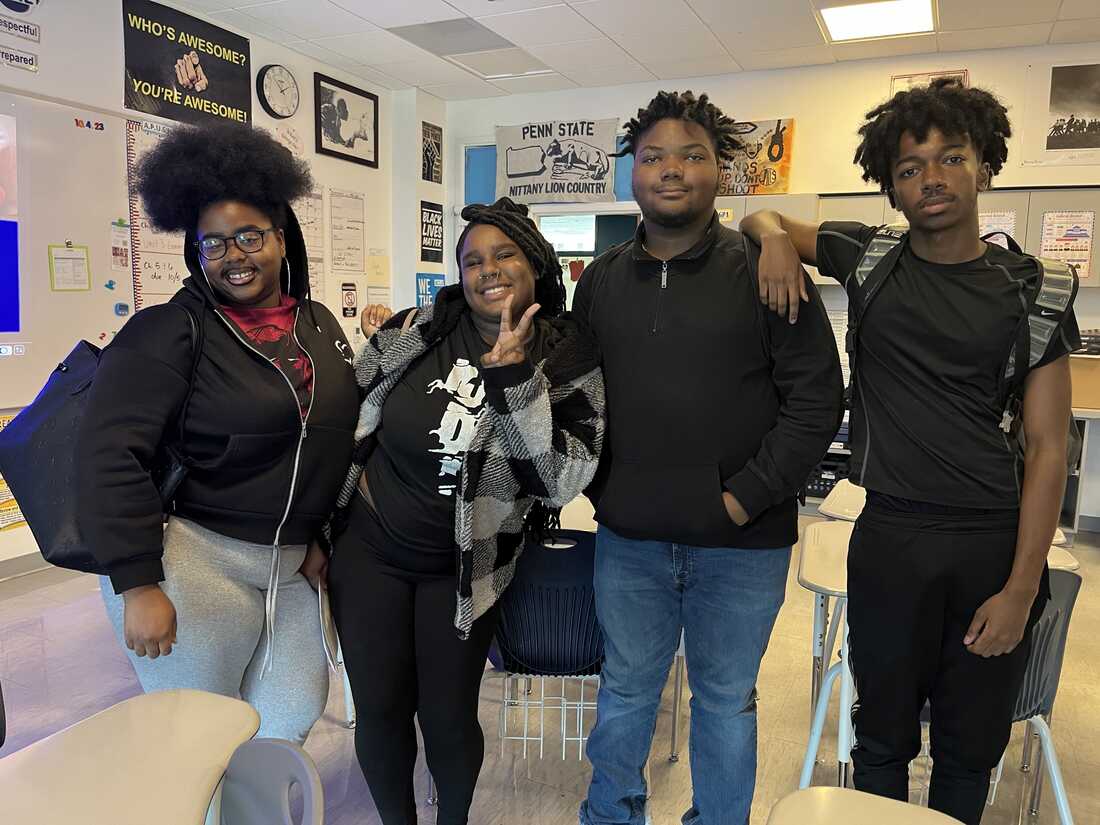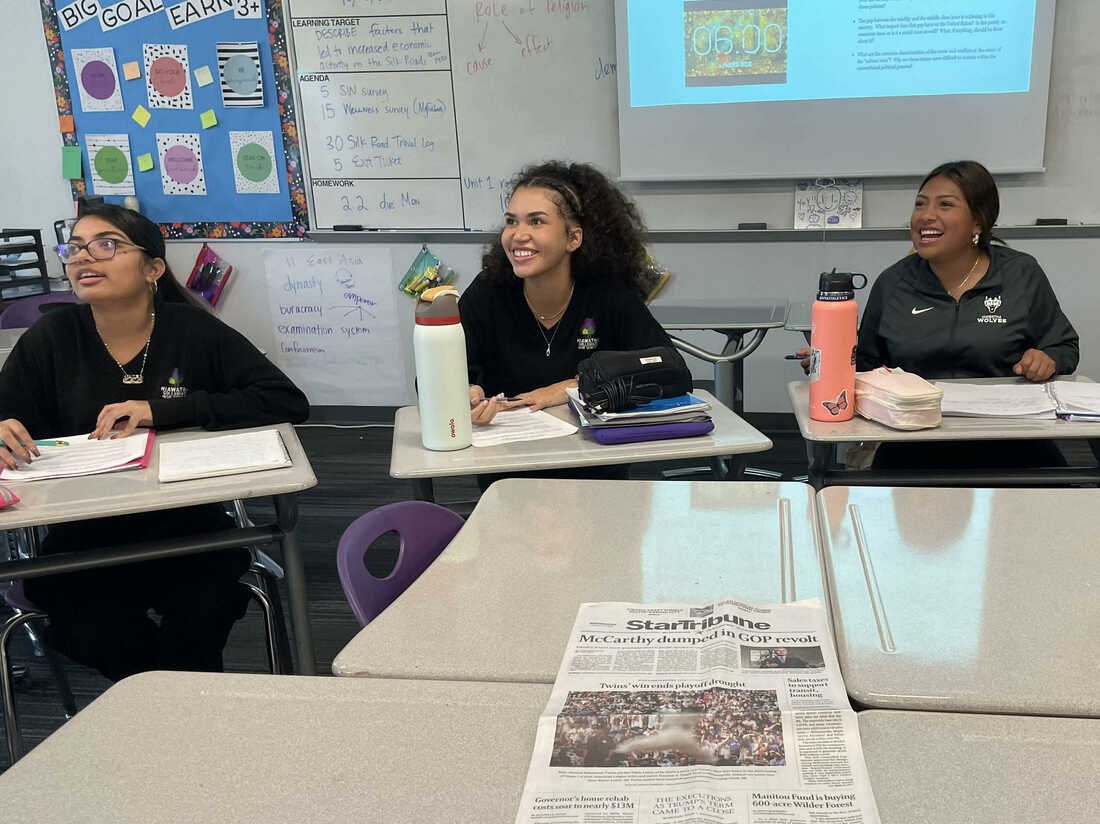
Instructor Christopher Gleditsch leads trainees in AP U.S. Federal government class at KIPP DC College Preparatory in Washington, D.C.
Laurel Wamsley/NPR.
conceal caption
toggle caption
Laurel Wamsley/NPR.

Instructor Christopher Gleditsch leads trainees in AP U.S. Federal government class at KIPP DC College Preparatory in Washington, D.C.
Laurel Wamsley/NPR.
As high school senior citizens at KIPP DC College Preparatory in Washington, D.C. took their seats in AP U.S. Federal government class today, they were currently speaking about the day’s lesson: what had actually simply occurred in the U.S. Legislature.
” Well, it took place last night,” stated instructor Christopher Gleditsch. He was speaking about what he had actually prepared trainees for in class a day previously: the ouster of Rep. Kevin McCarthy (R-CA) as Speaker of your home.
He struck play on a video revealing the vote and its special outcome.
” And with that gavel, history was made. This has actually never ever occurred prior to in American history,” Gleditsch informed the class.
The timing was great– the class had actually simply covered the legal branch and its leaders. The turmoil on Capitol Hill was a possibility for the class to take a look at how well– or not– that structure is working today.
Gleditsch asked why a little group of fellow Republicans pursued McCarthy.
” They chose to eliminate him due to the fact that he was siding with the Democrats at specific times. … He wasn’t adhering to being a Republican politician,” addressed a trainee called Sean. (NPR is not utilizing trainees’ surnames due to the fact that they are minors).

A few of the trainees in the AP U.S. Federal government class at KIPP DC College Preparation.
Laurel Wamsley/NPR.
conceal caption
toggle caption
Laurel Wamsley/NPR.

A few of the trainees in the AP U.S. Federal government class at KIPP DC College Preparation.
Laurel Wamsley/NPR.
” However like … isn’t that how Congress is expected to work? Aren’t you expected to collaborate?” Gleditsch countered.
” I seem like that’s how it’s expected to be,” a trainee called Jakiya recommended. “However how Congress is established now, it resembles Republicans and Democrats will constantly have that separation going on due to the fact that there’s specific circumstances that they can not settle on and they do not settle on. Like when we discovered Republican politician approaches and Democrat approaches, they see things in 2 various methods.”
Halfway throughout the nation, polarization was likewise leading of mind in Joe Kennealy’s class at Hiawatha Collegiate High School in Minneapolis. His trainees beinged in a circle, with the day’s Star Tribune paper scattered out in the center with the leading heading “McCarthy Dumped in GOP Revolt.”
” All right, senior citizens, I will shut off my voice and hand it over to you men,” Kennealy stated as the trainees settled in for the conversation area of class.
A senior called Luke stated it can be great to disagree: “However I believe that if those arguments end up being demonizing each other, even if you have those various worths, you’re never ever really going to get commonalities.”
His schoolmate Sarah countered, stating the repercussions can end up being expensive to not defend your beliefs.
” If we speak about the Supreme Court choice about reversing Roe v. Wade, it seems like often there requires to be polarization due to the fact that often the important things that are occurring in the federal government is, like, a direct attack on somebody’s identity,” she stated. “If you seem like your identity is being assaulted, then you’re undoubtedly going to have more enthusiasm.”

Trainees at Minneapolis’ Hiawatha Collegiate High School talk about polarization within the federal government.
Meg Anderson/NPR.
conceal caption
toggle caption
Meg Anderson/NPR.

Trainees at Minneapolis’ Hiawatha Collegiate High School talk about polarization within the federal government.
Meg Anderson/NPR.
These discussions about federal government aren’t truly a concern in a great deal of schools throughout the nation. That’s according to Kei Kawashima-Ginsberg, director of the Center for Info and Research Study on Civic Knowing and Engagement at Tufts University.
” Among the important things about civic education that’s tough is that we overlooked it for the previous 3 years approximately for sure,” she states.
A 2021 report moneyed by the National Endowment for the Liberal Arts and the U.S. Department of Education approximated that the federal government invests about $50 per trainee each year on research studies connected to science and mathematics, however just 5 cents on civics.
That’s an issue, Kawashima-Ginsberg states, due to the fact that not just does civics education teach trainees how the federal government is expected to operate, it likewise teaches trainees how to disagree with one another in an efficient method.
” Schools can use various chances because trainees will satisfy someone that believes in a different way than themselves. Which practice of doing that with someone and after that still returning with something they found out is going to go a long method,” states Kawashima-Ginsberg, who was on the report committee.
The stakes are high, states Paul Carrese, director of the School of Civic and Economic Idea and Management at Arizona State University, who was likewise on the committee.
” We are plainly revealing indications that we remain in an unsafe domestic political environment with anger and demonization at one extreme, disaffection, individuals simply tuning out at another severe,” he states.
However, he states, instructors can really harness that as a teachable minute– precisely like what the instructors in D.C. and Minneapolis did.
” One concept is, for instructors at any level, to make lemonade out of the lemon, when there is bad news or something striking in the news,” he states. “It’s a terrific human story, the United States of America. I’m not stating we’re perfect or ideal, however it is a terrific human story. We should get youths thrilled about it.”

The chaos on Capitol Hill offered fodder for high school civics classes, consisting of one at KIPP DC College Preparation in Northeast Washington, D.C.
Laurel Wamsley/NPR.
conceal caption
toggle caption
Laurel Wamsley/NPR.

The chaos on Capitol Hill offered fodder for high school civics classes, consisting of one at KIPP DC College Preparation in Northeast Washington, D.C.
Laurel Wamsley/NPR.
Back in the Minneapolis class, one trainee, Zakariya, was feeling less than enthused about the chaos in the halls of Congress. However, he stated, he’s not exactly sure whether legislators care what he believes.
” If I had a viewpoint, like, it would not truly matter to them,” Zakariya states. “They’re all like closed door conferences, like all the guidelines that they make.”
Kennealy, his instructor, was throughout the space listening.
” I wish to believe that that’s not where [Zakariya]’s going to end his journey,” Kennealy states. “However I do believe civics and federal government class, if it’s done right, does assist trainees to comprehend more of those systems that remain in location that they’re currently in.”
The classes provide tools to understand what’s occurring on Capitol Hill– and to acknowledge whether Congress is working like it should.